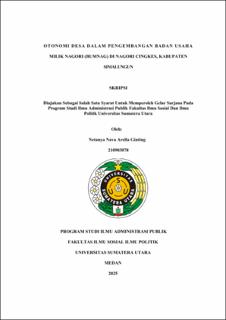| dc.description.abstract | Village autonomy is a form of decentralization that grants villages the authority to manage and regulate their community interests independently based on original rights and local values. In this context, Badan Usaha Milik Nagori (BUMNag) serves as an important instrument for villages to achieve economic independence through sustainable utilization of local potentials. This is stipulated in Law Number 6 of 2014 concerning Villages. However, in its implementation, the development of BUMNag in Nagori Cingkes still faces technical constraints, weak institutional capacity, and limited community participation.
The research method used is qualitative with a descriptive approach to provide an in-depth depiction of the conditions and dynamics of BUMNag development in Nagori Cingkes. Data were collected through in-depth interviews, field observations, and document studies involving village officials, BUMNag management, and community members who use BUMNag services in Nagori Cingkes. The analysis employs the framework of village rights, authority, and obligations based on the theory of village autonomy proposed by H.A.W. Widjaja (2003), which emphasizes the village’s role in independently and responsibly
managing local resources.
The results show that the implementation of village autonomy in the development of BUMNag in Nagori Cingkes has been underway but remains limited. In terms of rights, the village has established and managed BUMNag independently but lacks a directed business development strategy. Regarding authority, the village has the power to manage local potentials, but its implementation is not yet optimal, focusing only on one sector, namely clean water, while other potentials such as agriculture have not been fully utilized. In terms of obligations, the village has provided basic services in the form of clean water access to the community, but BUMNag’s economic contribution is still insignificant as it has not generated profits that can be distributed or reinvested in other businesses to improve community welfare. Therefore, it is recommended that the Government of Nagori Cingkes expand the types of BUMNag business units by increasing human resource capacity through training, developing business plans based on local potential such as agrotourism, and encouraging community participation to support sustainable BUMNag development. | en_US |


